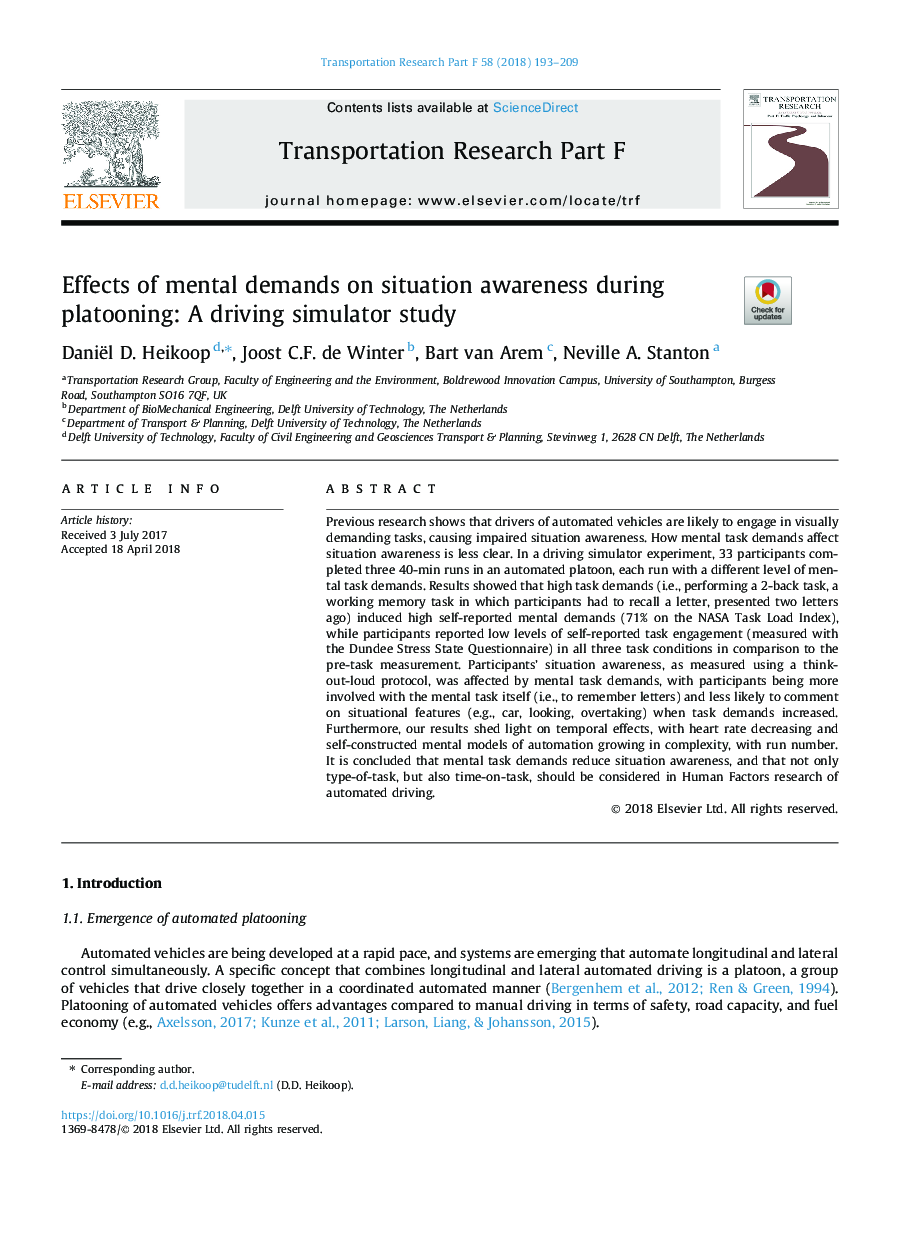| کد مقاله | کد نشریه | سال انتشار | مقاله انگلیسی | نسخه تمام متن |
|---|---|---|---|---|
| 7257527 | 1472429 | 2018 | 17 صفحه PDF | دانلود رایگان |
عنوان انگلیسی مقاله ISI
Effects of mental demands on situation awareness during platooning: A driving simulator study
ترجمه فارسی عنوان
تأثیر نیازهای ذهنی بر آگاهی از وضعیت در هنگام غلبه: یک مطالعه شبیه ساز رانندگی
دانلود مقاله + سفارش ترجمه
دانلود مقاله ISI انگلیسی
رایگان برای ایرانیان
ترجمه چکیده
تحقیقات پیشین نشان می دهد که رانندگان وسایل نقلیه اتوماتیک احتمالا به وظایف بصری نیاز دارند و باعث آگاهی وضعیت می شوند. چگونگی وظیفه ذهنی مورد نیاز آگاهی از وضعیت را کم می کند. در یک آزمایش شبیه ساز رانندگی، 33 شرکت کننده سه اجرا 40 دقیقه ای را در یک گروه اتوماتیک تکمیل کردند و هر کدام با یک سطح متفاوت از خواسته های روانی روبرو شدند. نتایج نشان داد که نیازهای کار بالا (به عنوان مثال، انجام یک کار 2 بار پشتی، یک کار حافظه کاری که در آن شرکت کنندگان مجبور بودند نامه را به خاطر بسپارند، دو حرف قبل را ارائه می دادند) باعث شد که خواسته های ذهنی خود را بالا ببرند (71٪ )، در حالی که شرکت کنندگان سطح کم گزارش مشارکت خود را (با پرسشنامه وضعیت استرس دانتی) اندازه گیری کردند در تمام سه شرایط کاری نسبت به اندازه گیری قبل از انجام کار. آگاهی از وضعیت شرکت کنندگان، با اندازه گیری با استفاده از یک پروتکل فکری و فکری، تحت تأثیر خواسته های کار ذهنی قرار می گیرد، که شرکت کنندگان بیشتر در معرض انجام وظیفه ذهنی خود قرار می گیرند (به عنوان مثال، برای یادآوری نامه ها) و احتمال کمتری در مورد ویژگی های موقعیتی (مثلا ، ماشین، به دنبال، غواصی) هنگامی که نیازهای کار افزایش می یابد. علاوه بر این، نتایج ما نور را بر اثرات زمانی، با کاهش ضربان قلب و مدل های ذهنی خود ساخته شده از اتوماسیون افزایش در پیچیدگی، با تعداد اجرا است. به این نتیجه رسیده است که وظیفه ذهنی، نیاز به کاهش آگاهی از وضعیت را کاهش می دهد و نه تنها نوع کار، بلکه زمان کار نیز باید در تحقیقات مربوط به رانندگی خودکار مورد توجه قرار گیرد.
موضوعات مرتبط
علوم انسانی و اجتماعی
روانشناسی
روان شناسی کاربردی
چکیده انگلیسی
Previous research shows that drivers of automated vehicles are likely to engage in visually demanding tasks, causing impaired situation awareness. How mental task demands affect situation awareness is less clear. In a driving simulator experiment, 33 participants completed three 40-min runs in an automated platoon, each run with a different level of mental task demands. Results showed that high task demands (i.e., performing a 2-back task, a working memory task in which participants had to recall a letter, presented two letters ago) induced high self-reported mental demands (71% on the NASA Task Load Index), while participants reported low levels of self-reported task engagement (measured with the Dundee Stress State Questionnaire) in all three task conditions in comparison to the pre-task measurement. Participants' situation awareness, as measured using a think-out-loud protocol, was affected by mental task demands, with participants being more involved with the mental task itself (i.e., to remember letters) and less likely to comment on situational features (e.g., car, looking, overtaking) when task demands increased. Furthermore, our results shed light on temporal effects, with heart rate decreasing and self-constructed mental models of automation growing in complexity, with run number. It is concluded that mental task demands reduce situation awareness, and that not only type-of-task, but also time-on-task, should be considered in Human Factors research of automated driving.
ناشر
Database: Elsevier - ScienceDirect (ساینس دایرکت)
Journal: Transportation Research Part F: Traffic Psychology and Behaviour - Volume 58, October 2018, Pages 193-209
Journal: Transportation Research Part F: Traffic Psychology and Behaviour - Volume 58, October 2018, Pages 193-209
نویسندگان
Daniël D. Heikoop, Joost C.F. de Winter, Bart van Arem, Neville A. Stanton,
